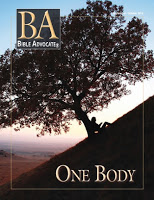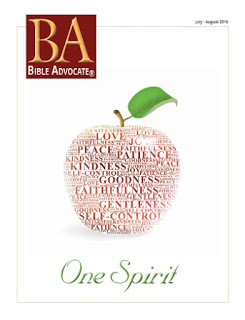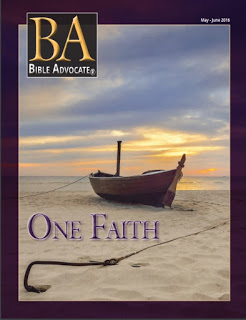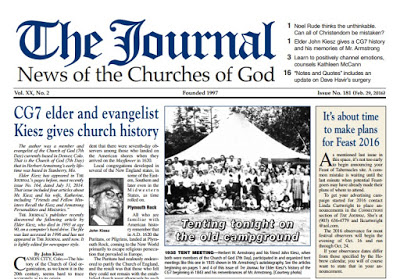The September/October issue of the Bible Advocate has been released by the Church of God (Seventh Day). The theme of the issue is the Church. Nothing controversial, as we'd expect from the Denver-based mother church of COGdom, it's all good standard biblical fare in a faith-affirming sense.
Almost all of the articles are sourced in-house; in fact it's a while since ex-WCG writers contributed to the publication, something which was common a decade or so ago.
Available to download.
Showing posts with label COG7. Show all posts
Showing posts with label COG7. Show all posts
Tuesday, 30 August 2016
Friday, 15 July 2016
Advocating a Different Spirit
I'm conflicted about the Bible Advocate. Years ago - we're talking the early 1980s - I was a hard copy subscriber. If nothing else it proved to me in my traumatized post-WCG state that a kinder, more generous form of COGism did indeed exist out there, albeit relatively small and distant. I still check out the magazine, though these days only online. It's not exactly riveting reading, especially for folk raised on the decadent triple-chocolate prophetic confections promoted by the mad-as-a-meat-axe Armstrong wing of the movement. The BA - published by the Church of God (Seventh Day) - is more like home made vanilla bread pudding. No artery-clogging additives, and "way healthier".
So why conflicted? Well, it's still a fundamentalist magazine, and for some of us that's now a very far country indeed. But it's not so "in your face", and gentler in tone than it's off-the-wall rivals. It's detractors in the shards of Herbal Empire might label it "Protestant", though I would question that ... who the heck knows what "Protestant" even means these days. Evangelical? Well, kind of, in an irregular sense.
The first thing that struck me about the July/August issue was the number of women contributors - Scott Ashley would have a hernia. The staff box lists a number of women too, including Associate Editor Sherri Langton. Fancy that.
The second thing that strikes an ex-WCG/LCG/UCG/PCG/whateverCG member is the absence of prophetic bullroaring. These folk actually know better. Compared to Beyond Today or Tomorrow's World the BA is positive, up-building and encouraging. If you're addicted to circus acts, you'll need to find an Armstrong periodical.
One item caught my eye in particular; a letter on the Questions & Answers page which asked: "Is the Holy Spirit a force or a person? What does CoG7 teach about the Spirit of God?" Interesting response.
Available to download.
So why conflicted? Well, it's still a fundamentalist magazine, and for some of us that's now a very far country indeed. But it's not so "in your face", and gentler in tone than it's off-the-wall rivals. It's detractors in the shards of Herbal Empire might label it "Protestant", though I would question that ... who the heck knows what "Protestant" even means these days. Evangelical? Well, kind of, in an irregular sense.
The first thing that struck me about the July/August issue was the number of women contributors - Scott Ashley would have a hernia. The staff box lists a number of women too, including Associate Editor Sherri Langton. Fancy that.
The second thing that strikes an ex-WCG/LCG/UCG/PCG/whateverCG member is the absence of prophetic bullroaring. These folk actually know better. Compared to Beyond Today or Tomorrow's World the BA is positive, up-building and encouraging. If you're addicted to circus acts, you'll need to find an Armstrong periodical.
One item caught my eye in particular; a letter on the Questions & Answers page which asked: "Is the Holy Spirit a force or a person? What does CoG7 teach about the Spirit of God?" Interesting response.
Available to download.
Tuesday, 3 May 2016
BA - welcome to COG alternity
You know you've slipped into a weird parallel universe when you pick up the Bible Advocate. Weird in a mostly good way. The first sign is a feature article that mentions (and quotes) both Dietrich Bonhoeffer and Martin Luther King in a positive sense. For that reason alone Israel Steinmetz's Kingdom Loyalties (on the subject of non-violence) is a few thousand kilometres down the flight path from anything published by the Armstrong derivatives. In fact, I don't believe I've ever seen Bonhoeffer quoted in any of the COG flagship periodicals (other than BA). And how many times have you run across an approving mention of MLK in Tomorrow's World?
I looked and couldn't find a single mention of "Bible prophecy" anywhere in this issue.
What you can find is an article by Ronald Gallagher on the crucifixion/resurrection, Calvin Burrell on the new covenant, Jason Overman on faith, Caitlin Meadows on abortion issues and a number of what I guess you'd call "devotional pieces." The closest thing to the stock-in-trade rigidities we've grown to expect in Armstrongism is a piece by former editor Max Morrow called Uphold the Faith!
There's no getting around it, COG7 is a fundamentalist church and the Bible Advocate is, naturally, in that mould. But it's a different sort of fundamentalism to anything those in thrall to Roderick Meredith, David Pack, Gerry Flurry and their ilk have experienced. Dare one say it, there's a pastoral tone to the Bible Advocate, and you get the feeling that you could disagree with one or more of the writers and still be welcome.
The PDF is available to download.
(Next in the series, Greg Albrecht's Plain Truth)
I looked and couldn't find a single mention of "Bible prophecy" anywhere in this issue.
What you can find is an article by Ronald Gallagher on the crucifixion/resurrection, Calvin Burrell on the new covenant, Jason Overman on faith, Caitlin Meadows on abortion issues and a number of what I guess you'd call "devotional pieces." The closest thing to the stock-in-trade rigidities we've grown to expect in Armstrongism is a piece by former editor Max Morrow called Uphold the Faith!
Some of the distinctive beliefs of the Church of God (Seventh Day), which we believe are among “the faith which was once for all delivered to the saints,” are being tested: namely, divorce and remarriage, tithing, clean and unclean meats, observance of extra-biblical holidays, and participation in military combat.Morrow is clearly "old school", but it's interesting what he doesn't list: Bible prophecy. Bearing in mind that COG7 is an Adventist denomination that traces itself back to the early days, it seems remarkable that they're not preoccupied - perhaps obsessed is a better word - with the eschatological junk-food diet that now defines their granddaughter churches.
There's no getting around it, COG7 is a fundamentalist church and the Bible Advocate is, naturally, in that mould. But it's a different sort of fundamentalism to anything those in thrall to Roderick Meredith, David Pack, Gerry Flurry and their ilk have experienced. Dare one say it, there's a pastoral tone to the Bible Advocate, and you get the feeling that you could disagree with one or more of the writers and still be welcome.
The PDF is available to download.
(Next in the series, Greg Albrecht's Plain Truth)
Saturday, 19 March 2016
Old Time COGs
Recent additions the sidebar now include three "pre-Armstrong" bodies, all separate but related to the larger COG7. One is the Salem, West Virginia church. One distinctive belief of this group relates to the timing of their annual Lord's Supper service (usually referred to as Passover in Armstrong sects and scheduled this year for the evening of April 21). These folk will be marking this observance in a few days time (evening of March 22) due to a different approach to the Hebrew calendar. A second group is based in Jerusalem, Israel, with congregations as far away as Auckland (I well remember experiencing a degree of "culture shock" when I attended one of their services many years ago). This ministry was established by Andrew N. Dugger, who features prominently in the Armstrong autobiography.
A third group is the Meridian, Idaho General Council COG7. Links to all three are found under "Smaller COG players".
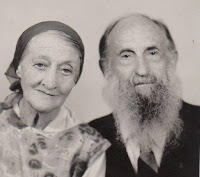 |
| Effie & Andrew Dugger (photo from Friends of the Sabbath site) |
Andrew N. Dugger (1886-1975) was the most famous Church of God (Seventh Day) leader in the twentieth century. He was born in Bassett, Nebraska.
Andrew N. Dugger's father, A.F. Dugger, Sr., had been an Advent Christian Minister. When commissioned by his church to do a study refuting the Sabbath, A.F. Dugger instead became convinced that the Sabbath should be observed. The result was a book he later published, called The Bible Sabbath Defended. For more than thirty-five years until his death in 1910, A.F. Dugger, Sr., was a leader in the Church of God (Seventh Day). His son Andrew, a school teacher and farmer, was in his early 20's when his father died.
A bright light in the sky around him seemed to Dugger to be a sign from God that he should follow his father's footsteps in the ministry. A.N. Dugger immediately sold his large farm and equipment, and went to the University of Chicago, where he majored in theology and public speaking, mastering Greek, Hebrew, and German.
Dugger periodically returned to Bassett to visit his mother and Effie Carpenter (1895-1980), a student of his whom he wanted to marry. Although he first proposed to her when she was sixteen, it wasn't until 1925 until they were married. They shared fifty years together.
Soon after college graduation, Dugger was invited by the Executive Committee of the Church of God to move to Stanberry, Missouri, to become editor of The Bible Advocate, a position his father had held before being forced to retire because of ill health. In 1914, Dugger arrived in Stanberry to begin his work in the ministry. For eighteen years he was editor, also serving as President of the General Conference. As field representative, he traveled widely, holding evangelistic meetings and public debates. The famous "Porter Dugger Debate," between Dugger and W. Curtis Porter, a Church of Christ minister, was later published as a book of over 230 pages. In 1919, Dugger wrote The Bible Home Instructor, which publicized the Church of God, and substantially increased its membership during the 1920s.
Two of Dugger's most adamant doctrinal positions were: a scriptural form of church organization with leaders chosen by lot rather than election, and a world headquarters in Jerusalem, Israel. After visiting Israel for only a year in 1931-32, Dugger returned to live in Sweet Home, Oregon. In 1935, A.N. Dugger and C.O. Dodd published A History of the True Church, which traces Sabbath-keepers from apostolic times to modern days. Dugger greatly influenced Herbert Armstrong, who was for years affiliated with the Church of God (Seventh Day) but later formed his own church, the Radio (later Worldwide) Church of God.
Dugger remained pastor at Marion, Oregon until 1953, when he and Effie settled permanently in Jerusalem, and launched the Mt. Zion Reporter. His aggressive leadership resulted in thousands of converts around the world. Andrew N. Dugger died in 1975 at the age of 89. Dugger's son-in-law, Gordon Fauth, continued the Jerusalem work...
(Adapted from biographical information here.)Dugger's educational attainments may go part-way to explain Herb Armstrong's truculent attitude towards him - he seems outrageously overqualified by COG standards even today, let alone the 1920s. A little inferiority complex perhaps?
A third group is the Meridian, Idaho General Council COG7. Links to all three are found under "Smaller COG players".
Saturday, 5 March 2016
The Journal - 181st Issue
The latest issue of The Journal is now out, dated February 29. One of the most prominent articles features a previously unpublished account by the late John Kiesz of the early days of the Adventist movement and the formation of Sabbatarian churches. Included are his recollections of Herbert Armstrong's early ministry.
Also featuring in this issue is an article by Noel Rude that's sure to set the feline among the avians. Rude asks "can the virgin birth be the mother of all heresies?"
Which, I think you'll agree, should generate (though not perhaps eternally generate) a lot of comment.
There's more of course. Editor Dixon Cartwright even includes a short item in the 'Notes & Quotes' section about the reappearance of AW.
The issue can, as always, be accessed in PDF format. A number of recent back issues can also be accessed from the sidebar, and more will be added as time permits.
I well remember the time when Herbert apparently was as much against worldly pleasures as I was: such as attendance at the movies, dancing, drinking. card-playing, and the wearing of excessive jewelry... but now all these things are permitted in his groups.And later.
I knew him as a humble man. But things have changed over the years. He grew too big for his own or anyone else's good, as far as spirituality is concerned.
The majority of his adherents have been thoroughly brainwashed, and there is nothing anyone can do for them anymore, as far as directing them into the right channels is concerned.Kiesz, an elder in CoG7 in the 1930s, passed away in 1993. It's quite a fascinating look at COG history from a different perspective.
Also featuring in this issue is an article by Noel Rude that's sure to set the feline among the avians. Rude asks "can the virgin birth be the mother of all heresies?"
The road to the Trinity began with the virgin birth. Preexistence and incarnation followed. The virgin birth was... the mother of all Christological heresy.Rude cites sources like Rudolf Bultmann and Helmet Koester along with a variety of ancient sources. The position he advocates is an adoptionist one; that "Jesus became a son of God, not by Eternal Generation and not by a virgin birth. Rather, his sonship was declared by a resurrection of the dead..."
Which, I think you'll agree, should generate (though not perhaps eternally generate) a lot of comment.
There's more of course. Editor Dixon Cartwright even includes a short item in the 'Notes & Quotes' section about the reappearance of AW.
The issue can, as always, be accessed in PDF format. A number of recent back issues can also be accessed from the sidebar, and more will be added as time permits.
Wednesday, 2 March 2016
A Parallel Universe: the March BA
The Bible Advocate is unlike any of the Armstrong COG publications. Rarely, if ever, is there an article featuring prophetic speculation. No BI. No inane punditry on the hidden meaning of world news. It's clearly not in the DNA of its publishers, the Denver-based Church of God (Seventh Day).
CoG7 is a fundamentalist Adventist body, no question, but it seems to avoid the tabloid apocalyptic speculation that goes hand-in-glove with its two larger relatives, the sibling SDA church, and its ratbag pack of daughters in the Worldwide Church of God tradition. When Herbert separated in the 1930s (they must have thrown a party!) CoG7 was left to follow its own course of development. It currently has churches established in forty countries (p.30).
Back to the magazine. The March issue is themed around baptism. But where, you might ask, are the proliferating exclamation marks! the CAPS, the frequent use of italics? And the lads at UCG's Beyond Today take note, just look at all the names of female writers and staff.
Many hardline Armstrongites would scoff, searching in vain for the heady blend of speculation, pontification and stupidity-on-steroids that they're addicted to. There's absolutely nothing Meredithesque here. Bland by comparison? Yes, but living off a diet of Rocky Road has health consequences. By contrast, a low-key, conversational tone has its own appeal. Not that I'm even faintly endorsing CoG7, just noting that it's one of the healthier options on the lard-laden COG smorgasbord.
The BA has been around a long time (this issue is Vol. 150, No. 2). It's already burned off The Plain Truth (unless you count the invisible Albrecht magazine), The Good News (both versions), GCI's Christian Odyssey, Meredith's The World Ahead, and I daresay it'll burn off the current crop of splinter mags as well.
The PDF is available to download.
CoG7 is a fundamentalist Adventist body, no question, but it seems to avoid the tabloid apocalyptic speculation that goes hand-in-glove with its two larger relatives, the sibling SDA church, and its ratbag pack of daughters in the Worldwide Church of God tradition. When Herbert separated in the 1930s (they must have thrown a party!) CoG7 was left to follow its own course of development. It currently has churches established in forty countries (p.30).
Back to the magazine. The March issue is themed around baptism. But where, you might ask, are the proliferating exclamation marks! the CAPS, the frequent use of italics? And the lads at UCG's Beyond Today take note, just look at all the names of female writers and staff.
Many hardline Armstrongites would scoff, searching in vain for the heady blend of speculation, pontification and stupidity-on-steroids that they're addicted to. There's absolutely nothing Meredithesque here. Bland by comparison? Yes, but living off a diet of Rocky Road has health consequences. By contrast, a low-key, conversational tone has its own appeal. Not that I'm even faintly endorsing CoG7, just noting that it's one of the healthier options on the lard-laden COG smorgasbord.
The BA has been around a long time (this issue is Vol. 150, No. 2). It's already burned off The Plain Truth (unless you count the invisible Albrecht magazine), The Good News (both versions), GCI's Christian Odyssey, Meredith's The World Ahead, and I daresay it'll burn off the current crop of splinter mags as well.
The PDF is available to download.
Saturday, 27 September 2008
Fessin' 'bout dressin'
Testimonies aren't a part of COG culture - at least not a part of any COG culture I've been part of. Whether the retreads in the Tkach sect indulge between cheery praise choruses is something I'm not aware of. Mormons testify, ratbag Evangelicals testify, but not us.
So when I ran across a testimony in the Bible Advocate by a former WCG member, it was time to pause and wonder.
I was a creative and sensitive child — the kind experts say is likely to become homosexual, primarily for failure to bond with the parent of the same sex. Brought up like this, a youngster may acquire gender identity disorder (GID) and become sexually confused in life.
In elementary school, I once went secretly to my teenage sister’s bedroom and found pairs of her nylon stockings in and around the wastebasket. I took a few of them back to my bedroom and put them on under the covers. Rubbing my feet and legs together, I felt the pleasurable slickness of the nylons. Then I hid them in the back of the lowest bureau drawer.
The next few evenings I occasionally wore them under an afghan wrapped about me. Family members may have known I was cross-dressing, but nobody said anything — not even Mother. She might have felt that I was in big trouble, but didn’t know what to do.
I don't want to gainsay Howard Mesick's sincerity; it takes guts to tell a less than flattering tale on oneself. But is it really helpful to relate this kind of thing?
Howard also mentions the late Richard Wiedenheft, one of the genuinely decent WCG pastors who left in the so-called "rebellion" of 1974.
I seriously considered suicide as a teenager but did not want to end my existence. I listened to The World Tomorrow radio program and was impressed because its beliefs seemed to follow what was in our Bibles. Persuaded that I could escape the pain and find a fulfilling life now and forever, I confessed my sins to God, asking His forgiveness and receiving the Holy Spirit... But I was still deceived about some things. The Armstrong church’s atmosphere of rank and privilege did little to help heal a man with family and personal baggage as deep-seated as mine.
Leaving Armstrong’s church, we attended the service of a distant congregation pastored by Richard Wiedenheft, often driving over one hundred miles on Sabbath to enjoy his interactive Bible studies. Or we drove to Harrisburg, Pennsylvania, to learn from sermons given by Bruce Chesney in a church there.
Mr. Wiedenheft eventually dissolved his church and encouraged its members to enter the Church of God (Seventh Day). After I joined this body, I had a religious experience. Standing by myself in our living room, I felt peace and assurance that God’s kingdom was not one of competitiveness and power structure, but of cooperation and eternal helpfulness.
Howard Mesick's observations about "rank and privilege" certainly ring true, and COG7 is a healthier place than WCG by far, judging from the experience of many who have attended there. His subsequent health problems have doubtless given him time to consider a great many things.
I’ve been institutionalized for the past sixteen years due to a paralyzed left side and other handicaps. Through all this, God has remade a confused, frightened, depressed soul into a trusting, rational person.
Testimonies: they still repel more than attract, and it's hard not to harbor suspicions about the psychology that underlies them. But as for Howard, I can only wish him well.
You can download the BA here. The article appears on pages 18 and 19.
So when I ran across a testimony in the Bible Advocate by a former WCG member, it was time to pause and wonder.
I was a creative and sensitive child — the kind experts say is likely to become homosexual, primarily for failure to bond with the parent of the same sex. Brought up like this, a youngster may acquire gender identity disorder (GID) and become sexually confused in life.
In elementary school, I once went secretly to my teenage sister’s bedroom and found pairs of her nylon stockings in and around the wastebasket. I took a few of them back to my bedroom and put them on under the covers. Rubbing my feet and legs together, I felt the pleasurable slickness of the nylons. Then I hid them in the back of the lowest bureau drawer.
The next few evenings I occasionally wore them under an afghan wrapped about me. Family members may have known I was cross-dressing, but nobody said anything — not even Mother. She might have felt that I was in big trouble, but didn’t know what to do.
I don't want to gainsay Howard Mesick's sincerity; it takes guts to tell a less than flattering tale on oneself. But is it really helpful to relate this kind of thing?
Howard also mentions the late Richard Wiedenheft, one of the genuinely decent WCG pastors who left in the so-called "rebellion" of 1974.
I seriously considered suicide as a teenager but did not want to end my existence. I listened to The World Tomorrow radio program and was impressed because its beliefs seemed to follow what was in our Bibles. Persuaded that I could escape the pain and find a fulfilling life now and forever, I confessed my sins to God, asking His forgiveness and receiving the Holy Spirit... But I was still deceived about some things. The Armstrong church’s atmosphere of rank and privilege did little to help heal a man with family and personal baggage as deep-seated as mine.
Leaving Armstrong’s church, we attended the service of a distant congregation pastored by Richard Wiedenheft, often driving over one hundred miles on Sabbath to enjoy his interactive Bible studies. Or we drove to Harrisburg, Pennsylvania, to learn from sermons given by Bruce Chesney in a church there.
Mr. Wiedenheft eventually dissolved his church and encouraged its members to enter the Church of God (Seventh Day). After I joined this body, I had a religious experience. Standing by myself in our living room, I felt peace and assurance that God’s kingdom was not one of competitiveness and power structure, but of cooperation and eternal helpfulness.
Howard Mesick's observations about "rank and privilege" certainly ring true, and COG7 is a healthier place than WCG by far, judging from the experience of many who have attended there. His subsequent health problems have doubtless given him time to consider a great many things.
I’ve been institutionalized for the past sixteen years due to a paralyzed left side and other handicaps. Through all this, God has remade a confused, frightened, depressed soul into a trusting, rational person.
Testimonies: they still repel more than attract, and it's hard not to harbor suspicions about the psychology that underlies them. But as for Howard, I can only wish him well.
You can download the BA here. The article appears on pages 18 and 19.
Friday, 2 May 2008
Two ex-WCG writers in latest BA
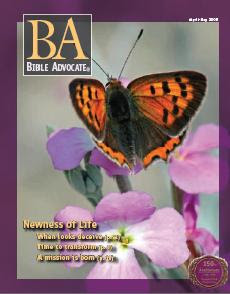 The latest issue of the Bible Advocate features two former WCG ministers. The late Richard Wiedenheft left in the "rebellion" of 1974. He pastored an independent Sabbatarian church for many years and published a newsletter called Focus On Truth. He later gravitated to the Church of God (Seventh Day). His article When Defeat Spells Victory appears in this issue.
The latest issue of the Bible Advocate features two former WCG ministers. The late Richard Wiedenheft left in the "rebellion" of 1974. He pastored an independent Sabbatarian church for many years and published a newsletter called Focus On Truth. He later gravitated to the Church of God (Seventh Day). His article When Defeat Spells Victory appears in this issue.Also appearing in the April/May BA is an interview with former Plain Truth editor Brian Knowles on the topic of repentance. The BA asked Brian (among other things) "Can there be corporate repentance for a church?" Here's his reply.
Throughout church history, denominations and their leaders have changed their official teachings, doctrines, and dogmas to comply with a better, more mature understanding of Scripture. This represents a form of corporate repentance. To be alive, the church must be a growing, dynamic entity — not just in numbers but in spiritual maturity. Collectively we are animated by the Holy Spirit, which leads us progressively into truth (John 14:26). Growth in knowledge and understanding is mandated in Scripture (2 Peter 3:18). This requires ongoing repentance of inferior understanding and the adoption of better understanding. Such repentance is a function of leadership. Instead of endlessly rehashing the basics, we should be going deeper into more mature understanding (Hebrews 5:11—6:3).
Also notable is a column by COG7 president Whaid Rose with a title to send a chill of horror down the spine of many hardline Armstrong devotees: Embrace the cross.
The BA is currently marking its 150th year in print, making it one of America's oldest religious periodicals.
Sunday, 24 February 2008
Sesquicentennial
 150 years ago, in the wake of the Great Disappointment, Gilbert Cranmer began what was to become the Church of God (Seventh Day). A group of Adventist Christians, estranged from the charismatic figure of Ellen White (prophetess of Seventh-day Adventism), set out on a resolutely independent path; one that leads - over much stony ground - to every single one of the Churches of God in the Armstrong tradition.
150 years ago, in the wake of the Great Disappointment, Gilbert Cranmer began what was to become the Church of God (Seventh Day). A group of Adventist Christians, estranged from the charismatic figure of Ellen White (prophetess of Seventh-day Adventism), set out on a resolutely independent path; one that leads - over much stony ground - to every single one of the Churches of God in the Armstrong tradition.It's worth remembering that the Church of God (Seventh Day) is still out there, and still publishing the Bible Advocate, the periodical that once featured Herbert Armstrong's by-line on the front cover. Looking at the sad record of subsequent schisms, COG7 clearly had something the Armstrong clones didn't: staying power.
Remember the Twentieth Century Church of God, the Biblical Church of God, the Associated Churches of God? How about the Global Church of God or the Church of God - a Christian Fellowship? Our history is littered with failed splinter groups, almost always centered around one man, with soon-to-be-dashed delusions of adequacy. In that, at least, they were true to Herbert Armstrong.
When today's crop of sects are footnotes in history, will COG7 endure? I'd like to think so. Part of the reason lies simply in the collaborative way things are run. No overbearing hierarchy, no defensive hyper-congregationalism, just a practical General Conference system that keeps people together while providing for diversity. The people Armstrong dismissively referred to as the "Sardis Era" have outlasted the upstart ad-man and most of his imitators.
May the next 150 years also be kind to them.
Subscribe to:
Posts (Atom)

